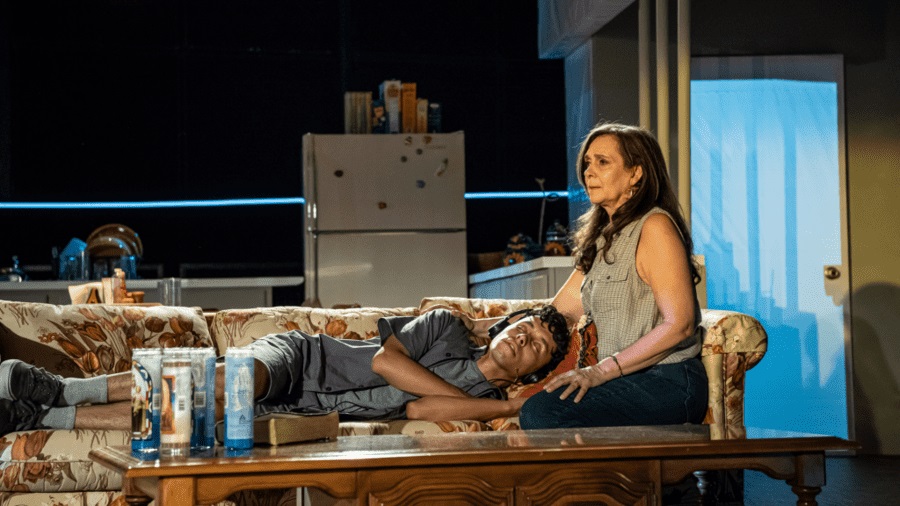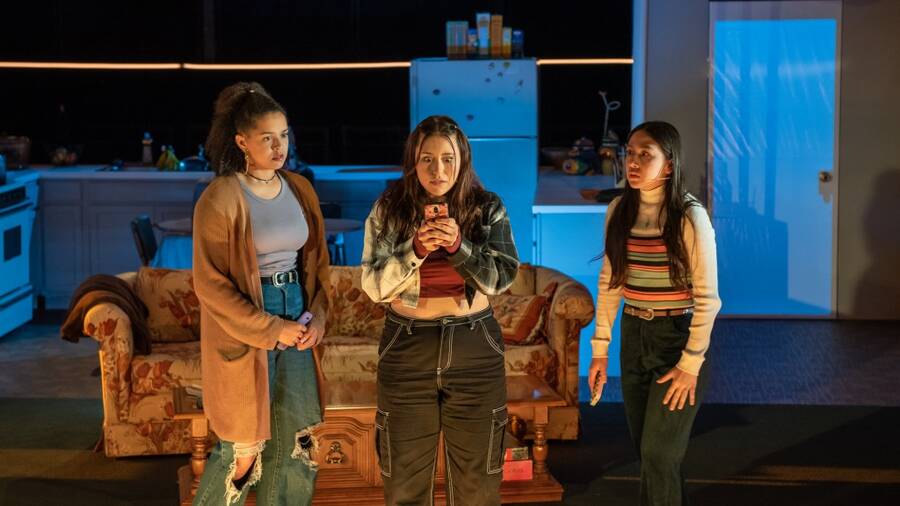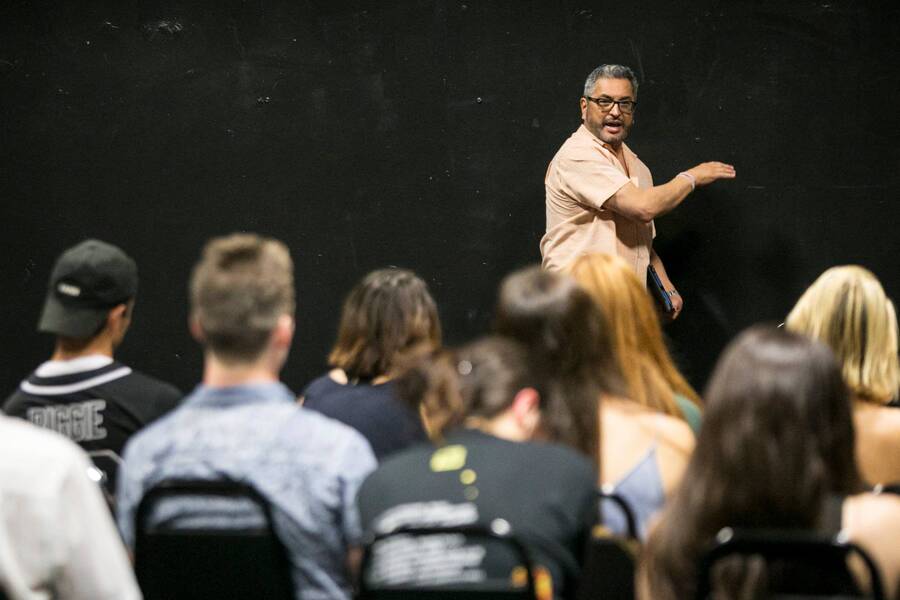To mark the launch of its 20th season, CalArts Center for New Performance (CNP) is presenting the world premiere of Scene with Cranes, a new play by the prominent American playwright Octavio Solis, directed by Chi-wang Yang, commissioned and produced by Duende CalArts, an initiative of CNP dedicated to developing and producing innovative work emerging from Latinx and Latin American community. Scene with Cranes, which follows a tight-knit East L.A. family in the wake of their youngest son’s mysterious death, runs at REDCAT through Oct. 1.
Solis writes plays rooted in Mexican American culture and community, told in richly poetic language that has earned him the PEN Center USA Award for Drama, the United States Artist Fellowship, and the Distinguished Achievement in the American Theater Award from the William Inge Center for the Arts, among many other accolades. Yang is an L.A.-based theatre director and multidisciplinary artist who is associate artistic director of CNP as well as assistant dean at CalArts School of Theater.
The following conversation is excerpted from a conversation between the playwright and director, who sat down together last spring during an early rehearsal process for Scene with Cranes to talk about Solis’s early days in writing workshops with María Irene Fornés, staging plays in bars in the late 1980s, their creative process, the music of Jean Sibelius, and the unarticulated grief of our nation.
You can listen to the full conversation of this CalArts Center for New Performance podcast here.
CHI-WANG YANG: We just wrapped up a three-week workshop working on your new play Scene with Cranes, here at CalArts and the Center for New Performance. I was thinking back—this process has been a pretty long journey so far. It started two years ago.
OCTAVIO SOLIS: This all started with Marissa Chibás. She wanted to commission me to write something, and I’d always had this idea to write this piece that was based on a piece of music [by Jean Sibelius] that I had been haunted by for so long. I said, “Yes, but rather than work with the director, let me do the first workshop so I could work out some things in the writing by working directly with the students.”
CHI-WANG: I’d love to hear you talk about what this workshopping process has been like. One of the values of CNP is to step outside some of the constraints of a really kind of aggressive, results-oriented rehearsal process, and actually give space to the artists. How was it jumping into this room, working with these actors on this new script?
OCTAVIO: Well, primarily I consider myself a language writer. I hear the play. I hear the scenes. I hear the characters before I see them, and hearing their voices gives me an image of them, but I hear their cadences, I hear the rhythm of the play. It’s almost like I’m listening to a radio play when I’m writing.
In this case, instead of workshopping the play itself, we workshopped the situation of the play, the conditions in which these people are living. That was different, because that meant that you were free to explore, what is a character’s chief gesture, how do they move, how do they respond to tragedy, how do they respond to joy, what makes them happy, who are they threatened by, who do they connect to in the room. I was really inspired by watching all that and comparing it to my text and seeing how what I was seeing up there could affect some kind of change on the text, because this text is different.

CHI-WANG: One of the things that first struck me when I read the script was that the world is so much a world in transition and in transformation, and that it starts in a very intimate kind of place, between the relationship of a mother to her daughter, a son to his parents, and then it starts to expand out and becomes also about a transformation of generations, and the powers, the histories, the traumas, and the aspirations between the generations. As it keeps growing, we’re also seeing that it’s even larger. It’s a transformation happening among the community across the urban landscape and gentrification. To me, it’s not just a distinctly American drama and tragedy, but there are definitely echoes of Greek tragedy in there as well. Do you consider this an adaptation of any sort? It seems like the germ of this play came from the Sibelius piece. How do you move from these inspirations or sources and let them kind of evolve and grow?
OCTAVIO: I have to find my engagement in it. I have to find, where do I fit in? How is this about me? So I was listening to Sibelius and seeing, in my head, a news report, a live TV feed of families in grief, Mexican women crying, held back by the yellow tape at night, and the cameras glaring at them, because of someone’s passing, a violent passing, and I said, “What do these have to do with each other?” Then I started to sort of get more kinds of snapshots, postcard pictures from the play, and I started seeing the characters and I said, “All right. Well, this is a way in.” It’s only after I’ve written it that I feel like there’s a little bit of Hecuba in Lourdes [the lead character, played by Chibás], a little bit of Trojan Women in this.
CHI-WANG: Is there a “standard” writing process for you, Octavio?
OCTAVIO: Oh, man, that varies. I like to sort of say, and I tell my students this, that I first have to be in a quiet, peaceful, relaxed state of mind, away from everything, away from the distractions, away from the internet, especially, and my phone, where I can focus and just get started. I have my work resistances that I deal with—like, I have to sharpen all my pencils even though I’m probably typing. I have to empty the trash. I have to go to the bathroom. I have a glass of water or my cup of coffee, or if I’m working at night, my glass of bourbon, and then, maybe send a few quick emails and then get started. I have this routine…Then I go to a place in my head where I see these people in a real place, and either I’ve been seeing them already and they’ve been calling for me for several months to, come on, write this play, and so I see them already and I don’t have to go very far to imagine exactly where they are, and then I start writing.
CHI-WANG: In a previous talk with some students, you were talking about how, in your process, you don’t really strategically outline, or that your process is not formulaic in how you build out a script. Could you talk a little bit more about that?
OCTAVIO: Yeah. It’s really hard to make characters out of a formula, because then they start serving the needs of the outline rather than the needs of their character, their own personal needs. It’s very important that my characters all have agency, that they have an opinion about what they say and a way to do it, and that they’re not obligated to me, the writer, in any way. Giving the characters agency means that you think of them as real people, and you think of where they are as a real place, not set on a stage. Don’t say, “Stage left is a doorway, stage right is this, the audience is over here.” Don’t go there at all. If it’s a house, see a real house. See all four walls, or five walls. Walk upstairs. Go into the attic. You didn’t know there was an attic? There’s an attic, and maybe there’s a basement. What’s in the basement? Maybe you’ll find some things that are going to be important in the play, but really, really see this as a place with its own integrity, a real place with real sunlight coming in, and people coming who are real to themselves. They can’t see you. They don’t know you’re there at all, but they’re real to each other. Because if you do it the other way, then, really, your play is taking place on a set and your characters are actors, and the thing about actors is, they know it’s a play, and they are aware that there’s an audience listening and watching, and if they are aware of that, they’re not going to be themselves. They’re going to modify their behavior. They’re going to censor themselves, and they’re going to be “good” people instead of who they are.
So I always say, don’t set it on a stage. I don’t want to see anyone in that scene except the people that are there, and then watch how the world opens up. Watch. I like being in a state of surprise every time I put down a line of dialogue. I like and enjoy and savor what my characters do. It makes me feel like: What are you going to do next? It makes me feel delighted, delighted to discover what the next line’s going to be, and that’s the kind of place I want to be in.

CHI-WANG: One of the real pleasures has been having you in the rehearsal room and just being kind of a little bit of a fly on the wall of your writing process. It really feels like there’s not only this beautiful company of eight actors in the room, but there’s this whole other company of eight characters that you’re collaborating with in real time.
OCTAVIO: Oh, yeah. It’s nice to sort of see them in 3D instead of only in my head or on a page. It’s nice seeing them and feeling like, okay, now I know what that character looks like. I see how that character walks. I see how that character regards the other one. I see how she reacts. Now, how can the text accommodate that? It has to be able to mold and shape itself to the needs of the company, especially when the play is still finding itself. Then, I go, okay, I know something. They just showed me a direction I could go that I didn’t know was there. They just opened a new door in the house to a room I didn’t know was there. Let’s see what happens when we go there.
CHI-WANG: Are you someone who feels like your work comes from a necessity? That this work is necessary right now?
OCTAVIO: Well, it’s all necessary. I’ve written things that I feel are whimsy, that I do for myself or to have fun. But this pandemic has made art really necessary, and I think this play reflects the really unacknowledged grief that the world is undergoing. It just hasn’t really stopped to take it in—how many people have died in the world because of COVID, how our world has changed because of COVID, how it’s changed the way we function with each other. I don’t think it’s really acknowledged yet, not in a global sense. I know there is mourning happening for a lot of people who have lost loved ones and who’ve lost their livelihood, who’ve lost businesses and lost their theatre, but I think that it’s still sort of still just below the surface, and I think it’s going to come up, and I think this play reflects that. I think that’s sort of where we’re at right now. We’re digging into that place where we’re asking why, why, and even bigger questions like, why is art necessary? We sure need it, man.
CHI-WANG: Something I wanted to ask you about was, just to kind of go back into your history as a writer—is it correct that you first started writing when you were in Dallas?
OCTAVIO: I started writing plays to kind of cast myself because I found a job at another bar called the 500 Café which was kind of a New Wave bar, and I saw that Wednesday nights, the stage was empty. There was nobody there, and I asked my boss, “Hey, can I have that?” He said, “Sure, but I’m not paying for it. I’m not paying everybody.” “That’s okay. I’ll pay them.” I started a poetry reading series, and I knew poets, good poets that had books or were published. Then I started saying, “Well, maybe we can have a performer, a guitarist come and play in between the two poets.” Then I started thinking, “Maybe I should write some plays for the next Wednesday.” Because it would only happen on Wednesdays. It was called Words on Wednesday. So I started writing these funky verse plays, because it was poetry. We had so much fun.
CHI-WANG: I love that this started not at the formal theatre space, but at the bar. What was the vibe like of these early shows?
OCTAVIO: Well, I knew my audience. They were artists from the area, and painters, and club people, and the occasional real drunk, but often young, because they were attracted to it because of the bands that played, so they started coming in droves. The first time I did Words on Wednesdays, I had like 10 people. By the time I did my play, which was six weeks later, and only on for one night, it was full, like 60-70 people, standing room only! Eventually, we had to move them outside, and I started doing a saga. I did 10 plays, and I called it The Geometricia Saga. It was a blast writing for them. I’d write a new one every six weeks and then we’d rehearse it three, four days, and then we’d put it on, off book. I’d stage it very quickly, because it’s a small stage for, like, a band, and we went around the tables where the people were drinking. Some people said, “Hey, can you write me a scene?” One was a dancer, so I said, “Oh, I’ll write a ballerina segment where a ballerina just comes on and does a dance,” and these guys said, “Hey, can we compose or write music for you?” I said, “Yeah,” and so they started getting involved after the first one, and they became the house band for the thing, and I collaborated with them on writing songs, and they were superb. They also provided us with the rehearsal space at the warehouse they were squatting at, and it was a magical time. I didn’t know anything about playwriting, really. I was making all kinds of mistakes, beautiful mistakes, because I didn’t know what I was doing, and that was so freeing. That launched my playwriting career.
CHI-WANG: When was your first commission as a playwright?
OCTAVIO: My first commission as a playwright was also my first play about my culture, my first Latino play, and it happened shortly after those plays. I would say it happened around 1988. Cora Cardona, who was the artistic director of her company, Teatro Dallas, said, “Write us a play.” She said, “Write something about your own culture.” I didn’t know there were other Latino actors—I didn’t know there were Latino plays. I didn’t know there were directors who could direct plays about my culture. I didn’t know that existed until then. I didn’t know about Luis Valdez. It was a big hole in my education, so I did some research. I read all these works, and they were wonderful.
CHI-WANG: Could you talk about what that meant for you, to have that kind of realization that there were Latino theatres, that there were Latino actors and communities, and Chicano actors and theatres that you could write for and write with?
OCTAVIO: I think it made me realize who I was. I think, prior to that, I was trying to fit into a very white world. I realized: I know who I am now. I haven’t looked back. All my plays are written for Latino companies and Latino actors and have a Latino aesthetic that is unique to me, but also, there are things that are shared with other Latinos, especially the Mexican American Latinos, that we all kind of share in common. We’re all so very different, but there are similarities. Once I accepted myself, once I put on and realized the skin that is me, then other theatres wanted me for that. They wanted me more. They didn’t want me because I wrote white plays for white actors. They wanted me because I wrote plays about my culture, because of who I was, and that was a revelation for me.


